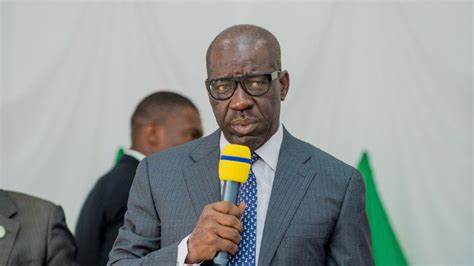Former Edo State Governor Godwin Obaseki has strongly criticized the Supreme Court’s decision to uphold Monday Okpebholo’s election victory, describing the ruling as a devastating setback for Nigerian democracy and warning of dire consequences for the country’s democratic future.
In a passionate statement released on his official social media platform shortly after Thursday’s landmark judgment, Obaseki expressed profound disappointment with the apex court’s unanimous decision to dismiss the appeal filed by the Peoples Democratic Party and its candidate, Dr. Asue Ighodalo.
The former governor maintained his unwavering belief that the September 21, 2024 governorship election was fraudulent and that the PDP candidates were the legitimate winners of the contest.
“I am profoundly grateful to the good people of Edo State and Nigerians for their overwhelming support for the victory, which we believe our party, the Peoples Democratic Party (PDP), its candidate, Dr. Asue Ighodalo and his running mate, Osarodion Ogie, won,” Obaseki declared in his statement.
The outgoing governor detailed the extensive legal battle his party pursued through multiple judicial levels, emphasizing their conviction that the election results were compromised by systematic manipulation.
“But unfortunately, and most surprisingly, all the courts have ruled against us,” Obaseki lamented, expressing bewilderment at the consistent judicial rulings against his party’s claims.
Despite his strong disagreement with the court’s decision, Obaseki acknowledged the authority of the judiciary while maintaining his position that justice had not been served.
“Although we strongly disagree with the decision of the Supreme Court, but as adherents to the rule of law, we are bound by their verdict,” he stated, demonstrating respect for judicial authority even in defeat.
The former governor issued a stern warning about the broader implications of the court’s decision, suggesting that the ruling could have far-reaching consequences for Nigeria’s democratic institutions.
“We want to caution that the iconic manner in which the Edo election was manipulated, coupled with the judicial validation it has received, portends grave danger for Nigeria’s democracy,” he warned, framing the dispute as larger than just Edo State politics.
In a remarkable display of spiritual resilience, Obaseki concluded his remarks by invoking faith and divine intervention, encouraging his supporters to maintain hope despite the legal setback.
“As people of faith, we leave our matter in God’s hands, trusting that only He knows the appropriate time and manner to deliver divine justice and redemption to our people,” he said, drawing on religious themes that resonate strongly with many Nigerian voters.
The former governor urged his supporters to remain committed to the broader struggle for democratic reform in Nigeria, despite the disappointing outcome of the legal challenge.
“I encourage our people to keep hope alive as we persist in the struggle to redeem our fatherland,” Obaseki concluded, positioning the electoral dispute within the context of national democratic renewal.
The Supreme Court’s decision came after a comprehensive legal battle that began at the Election Petition Tribunal and progressed through the Court of Appeal before reaching the apex court. The five-member panel, led by Justice Lawal Garba, delivered a unanimous verdict that effectively ended the PDP’s legal challenge to the election results.
Justice Garba’s ruling highlighted significant weaknesses in the petitioners’ case, noting that they had only challenged results from 395 of the state’s 4,519 polling units. The court found that the 19 witnesses presented by the PDP failed to provide compelling evidence sufficient to overturn the lower courts’ decisions.
The apex court emphasized that the PDP candidate had not successfully discharged the burden of proof required to demonstrate that electoral malpractice had occurred on a scale sufficient to affect the outcome of the election.
The ruling represents a decisive victory for Senator Okpebholo and the All Progressives Congress, providing final judicial confirmation of his electoral victory and clearing the way for his administration to govern without further legal challenges.
The protracted legal battle had created uncertainty about the legitimacy of the election results and delayed the full transition of power in Edo State. The Supreme Court’s decision brings closure to months of legal proceedings that had kept the state’s political future in limbo.
For Obaseki, the ruling marks the end of his political influence in Edo State and represents a significant defeat for his efforts to install a chosen successor. The former governor’s emotional response reflects the personal and political stakes involved in the electoral dispute.
The case highlights ongoing concerns about electoral integrity in Nigeria, where disputed elections frequently result in lengthy court battles that can extend uncertainty for months or even years after voting concludes.
As Edo State moves forward under Senator Okpebholo’s confirmed leadership, the broader questions raised by Obaseki about

















